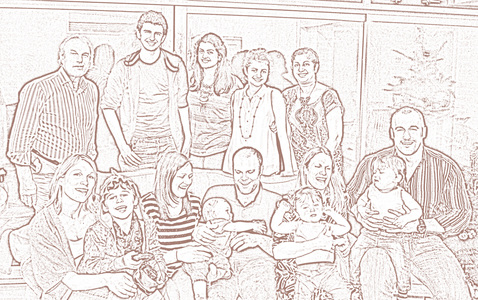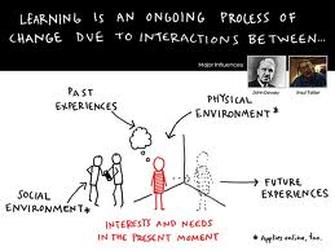
This reflective mood encouraged me to think of the idea of development in the context of being part of a family. It seems to me that development is an important process for keeping the family together and for continually engaging members of the family in the process of nurturing or enabling the development of its members sometimes by design but often as a consequence of the way life unfolds.
Development as a family comes from sharing experiences good or bad and participating in and talking about small and significant events and people so that members of the family develop a shared sense of history and belonging. This was brought home to me recently as I interviewed my mother and father who are in their late 80's in order to record the story of their early life growing up in Manchester in the 1920's and 30's. One reason for doing this was to provide our family with a clearer sense of our history the detail of which will be forgotten when they are no longer with us. In fact the stories that parents tell about us and our childhood are one way in which we can appreciate our own development.
Development as a family manifests itself in what we do to, with and for each other, the sacrifices that are made and the willingness to take on rather than avoid family commitments regardless of cost. In a well functioning and caring family everyone is involved in developing themselves - to be better parents/grandparents, spouses, workers, students etc.. and often for others - children, grandchildren, siblings or the children of siblings.
A year in the life of a large family inevitably contains many events some of which cannot be predicted in advance. This year the serious illness of one family member completely disrupted our plans yet brought us together to support each other. We are all different and more empathic having had this challenging experience but we would have never wished for such an experience.
Development is easiest to see in the youngest members of the family for example my youngest grandson was born exactly a year ago and in the space of a year he has grown from a tiny helpless baby into a little boy able to walk and let you know what he wants and doesn't want to do. But another grandson shows me that not all babies are able to develop at such a pace if they are born with conditions that affect their physical and cognitive development. Their measures of progress are smaller and much harder to see and harder for them to accomplish. Nevertheless when witnessed they bring much joy and hope for a better future.
Formal learning has an important role to play in the development of a child. A year ago my six year old grandson was a hesitant and reluctant reader. Thanks to the efforts of his mum and school he is now a fluent reader willing to search for and read the books that interest and inspire him opening up a world that is not accessible to those who cannot read. While they are at school or university our children's developmental processes are mostly hidden from us - we gain insights when we see them doing their homework or more intensely when they revise. My youngest daughter is revising intensively for her mock GCSE's at the moment - it's a serious arduous task and she is far more engaged than I ever was at her age.
As parents we encourage our children to develop their interests beyond the classroom - we want them to have friends and be confident socially, to enjoy and engage in sport, to join clubs and societies, have hobbies and be aware of the world around them. We are happy when they want to get involved but are disappointed when they do not use the opportunities they have and sometimes we pressurise them into doing things that we believe are for their own good. We push and pull, reason and cajole, and sometimes just insist in what we believe is for the greater good of encouraging development that will help and enable our children to be happy, fulfilled and successful in the future. Sometimes these actions result in tensions as our children let us know that this is not what they want to do.
Perhaps our creative involvement as parents in these forms of development is in the success we have in enabling our children to discover things that interest them that they value rather than imposing on them what interests us and what we value. I learnt this the hard way: the fact that I was a geologist seemed to be a burden when I tried to interest my three children in the geology at our feet when we were on holiday. I carried on behaving like this with my three step children. I failed to interest any of them in something I was passionate about but when one of them became fascinated in archaeology he reluctantly admitted that he could see the parallels and could see why I was interested in it!
So our involvement in our own children's development must balance the aspirations we have for them and the need for our children to discover for themselves their own purposes and ambitions and create their own intrinsic motivations for pursuing what they value. There comes a point in this familial developmental process where we start thinking that our children must do things for themselves. For several years we tried to encourage our son to learn to drive. Thanks to friends who were willing to give him lifts and the absence of a need while at university to drive he put it off until he suddenly realised he needed it in order to get a particular job. So he paid for his own lessons and after three goes he passed his driving test. We all rejoiced at the new freedom's this act of development afforded but it only came about when his need created the desire for him to persist until he had achieved this goal.
Most personal development goes on unseen, unrecorded and unrecognised. It just goes on and on as our children grow into the people we hope and they want to become. As parents we rejoice when we think our children are moving in a direction that we think holds promise but despair when they make decisions that we don't think will lead to anything of value.
All too often we forget that much of our own learning was through the experience of trying - regardless of whether something worked out or not. Perhaps this is the hardest lesson in the family development process letting our children make their own mistakes - and being ready to help them when they do. And it can be painful process. There are times when our children develop us in directions that we do not want to go. At times we may have to compromise our beliefs in order to maintain the relationships that make up a family. Above all we have to trust that they will find their own way and make the decisions that are right for them in their circumstances.
So the continuous process of creating and recreating family is a never ending developmental process in which all members are involved for themselves and for others.





 RSS Feed
RSS Feed